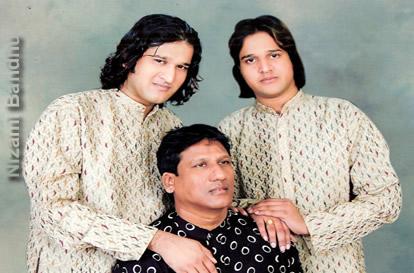The Nizami Bandhu: A Family Devoted to Qawwali
Nizami Bandhu
Throngs of visitors and pilgrims gather for prayers in the marble courtyard of the shrine of Hazrat Nizammudin, a Sufi saint. But few realize an extended family of musicians called the Nizami Bandhu, live right inside the grounds of the 7th century-old sacred shrine.
Chand Nizami is 48-year-old and leader. His family are Qawwali musicians. The word Qawwali comes from the Arabic word Qual, meaning “poems that are full of praises to God.” Nizami said tears often come to his eyes as he sings.
“We get a strong feeling in our heart and soul. We sing the name of god and Sufi saints, and by singing their name we feel at peace,” he said.
Every week, on Thursday evenings, the Nizamuddin shrine is packed with people of all religions. They sit cross-legged on the floor, knee-to-knee, and listen to Qawwali music for hours into the night.
The 12 members of the Nizami Bandhu are all men. They sit in two rows facing the tomb of the saint, Hazrat Nizammudin.
The lead singers play the harmonium, a hand-pumped keyboard. The others clap their hands or beat traditional drums.
“There’s a big difference between performing on the stage and performing inside a sacred shrine,” Nizami said. “When your guru or saint is in front of you, and you’re singing face-to-face with God, it’s an entirely different atmosphere.”
Nizami’s nephew, 28-year-old Sohrab Nizami, grew up in the midst of this spiritual shrine listening to the music.
“Our uncle, father, and grandfather used to take us to see these Qawwali music programs,” the nephew said. “When they would rehearse, we would also sit with them. We enjoy following in their footsteps and learning from them.”
Now, his brother Shadab brings his 5-year-old son to rehearsals.
“This Qawwali music is a family legacy that’s within our blood. We’d like to carry forward and continue this tradition of Qawwali for many generations by teaching our children,” he said.
In the busy Muslim neighborhood around the shrine, passersby can often hear the group’s CDs playing in street stalls. But, it was the family’s cameo appearance in the recent Bollywood film “Rockstar,” filmed at the Nizamuddin shrine, that’s bringing them greater fame in Delhi.
As the Nizami Bandhu performed inside a school auditorium in Delhi, 11th grader Shreya Sharma said the Qawwali music speaks directly to her.
“What makes it special is the way it appeals to the masses, the way it is energizing, and the way it is compelling. It’s like an escalator to heaven,” Sharma said.
The music appeals to people from different traditions, including Muslims and Hindus. Sohrab Nizami said the family also wants to continue reaching out to audiences of all ages.
“This is a gift from God, so that’s why we want to continue this,” he said. “We don’t want to lose this treasure.”
The family is bringing the music to Western audiences. They are performing in California this fall.
